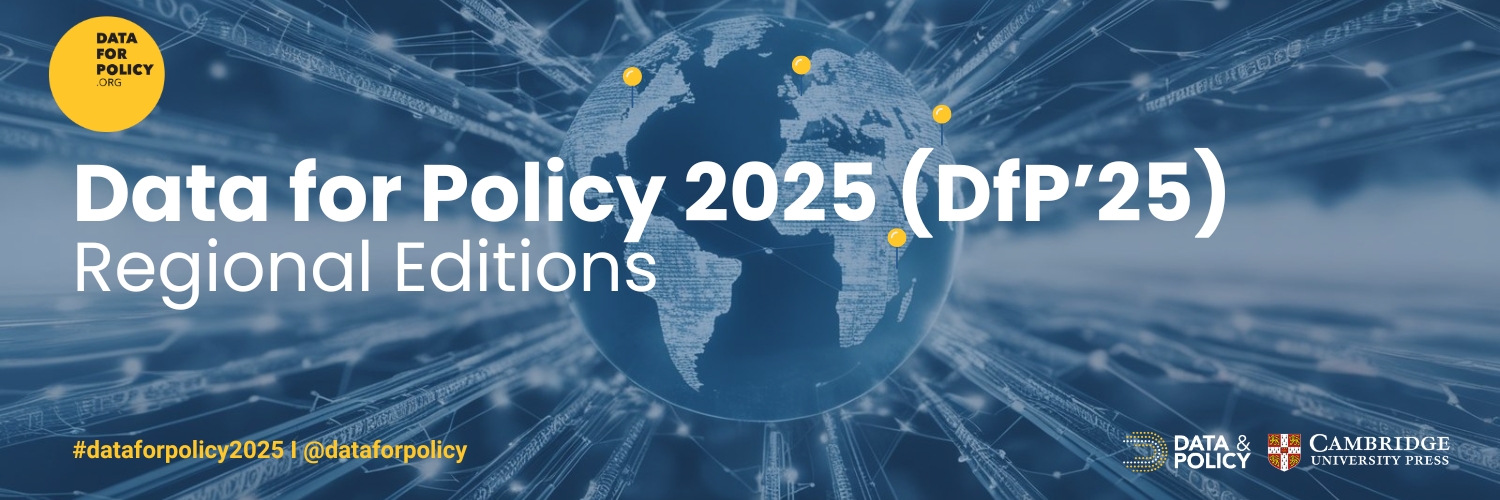
Guideline for Special Track Submissions
Welcome to Data for Policy 2025 Conferences! We are excited that you are considering submitting a proposal for a special track at our conference. Below, you will find a structured guide to help you understand the role of Special Track Chairs, the submission process, and expectations if your special track proposal is accepted.
1. About Special Tracks:
- They are innovative tracks aligned with the regional conference theme while also complementing the broader theme of Data for Policy. They will enhance the conference program by integrating with the standard tracks and adding diverse, timely perspectives on data and policy challenges.
- They are curated by Special Track Chairs who will play a pivotal role in attracting and reviewing submissions, chairing sessions, and guiding discussions. Successful tracks may also lead to a Special Collection in the Data & Policy, an open-access journal published by Cambridge University Press.
2. Why Submit a Proposal?
Accepted special tracks will be included in the Data for Policy 2025 Call for abstracts, full papers and panels aiming to attract submissions that will undergo a peer-review process. All accepted submissions will be presented at the conference; in addition accepted full papers will be published in Data & Policy, after the conference.
3. Responsibilities of Special Track Chairs
- Promoting the Call: Chairs are expected to actively promote their track within their networks, encouraging full paper submissions from experts in the field.
- Curating Content: Special track chairs will take on the role of the first reviewer for all submissions in their respective tracks while the conference chairs will act as handling editors. They will also be responsible for organizing content into sessions at the conference and overseeing the publication of accepted papers. This structure ensures a streamlined peer-review process and effective management of conference content. Content will be shared via preprints on Zenodo, videos on YouTube (for full papers), and full papers in Data & Policy journal.
- Operational Role at the Conference: Chairs will attend in-person, register as delegates, and chair their special track sessions. Conference organizers may reassign submissions between tracks as needed to balance the programme.
- Post-Conference Engagement: Following the event, Chairs may continue to develop their track by acting as guest editors for a Special Collection in Data & Policy, inviting further relevant articles for publication.
4. Special Track Proposal Submission Instructions
- Submission Details:
- Submit a description (up to 1000 words) through EasyChair.
- If a group proposes the track, appoint a lead contact for coordination.
- Proposal Requirements:
- Title of the Special Track.
- Motivation and topics covered.
- Alignment with conference theme or broader theme of Data for Policy.
- Plans for outreach to relevant communities.
- Provide the list of experts to approach for track promotion and peer-review support, and mitigate any conflicts of interest.
- Interest in editing a Special Collection for Data & Policy.
Following the review, successful proposals will be featured in the main call for abstracts, full papers and panels.
5. Expectations of Special Track Chairs Post-Acceptance
Pre-Conference:
- Finalise and submit the track description for inclusion on the Data for Policy conference page.
- Circulate your track announcement, encouraging submissions.
- Review all track submissions as 1st reviewer, including full papers and session proposals, in coordination with the Regional Committees.
- Organise accepted submissions into sessions or panels.
During the Conference:
- Chair sessions, or designate session chairs, to lead discussions.
- Be an active delegate, representing your track and fostering dialogue.
Post-Conference:
- Write a comprehensive report on the track’s success for publication as a journal article or a Data & Policy blog post.
- Evaluate potential for further publications, especially if pursuing a Special Collection.
6. Participation and Registration
- Conference Registration: Special Track Chairs are required to register for the conference and ensure that all track presenters are also registered. Inclusion scholarships are available for those with financial constraints to ensure participation.
- Programme Inclusion: Tracks that do not meet minimum accepted submission thresholds may not be included in the conference. In such cases, accepted submissions may be reassigned to standard sessions, and Chairs may assist in peer-review activities.
We look forward to your innovative proposals and thank you for your dedication to making Data for Policy 2025 Conferences a success!
